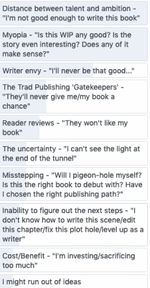There's been an interesting discussion on one of my Facebook writers groups about author fears/doubts—and some great responses from people about how they've experienced writer fear in one form or another. However, there was not much in the way of how they push through their fear.
Here is a list of the type of the various fears the group came up with, in order of most experienced to least:
So here's my question: Have you experienced any of these doubts? How did you push through it/them?
As an example, here's my story: I fell prey to #1 on the list. I put off my WIP for 10 years believing I didn't have the experience and skill necessary to do the story justice. However, when I joined a local writers group, their support (and nagging) helped me push through that doubt and gave me the confidence to keep going. The group meets every 3 weeks, so I also began to run out of chapters to read at each session, which forced me to forge on so I wouldn't run out of material to read. I also gave myself a deadline—finish the draft before I turned 30. Those few things, helped me push through this doubt.
Here is a list of the type of the various fears the group came up with, in order of most experienced to least:
- Distance between vision and skill: "I'm not good enough to write this book"
- Myopia: "Is this WIP any good? Is the story even interesting? Does any of it make sense?"
- Writer envy: "I'll never be that good..."
- The Trad Publishing 'Gatekeepers': "They'll never give me/my book a chance."
- Misstepping: "Will I pigeon-hole myself? Is this the right book to debut with? Have I chosen the right publishing path?"
- Writer underwater/Drowning in paper: "I can't see the light at the end of the tunnel"
- Inability to figure out the next steps: "I don't know how to write this scene/edit this chapter/fix this plot hole/level up as a writer.”
- Cost/Benefit: "I'm investing/sacrificing too much"
- Worry over inspiration: “I might run out of ideas.”
So here's my question: Have you experienced any of these doubts? How did you push through it/them?
As an example, here's my story: I fell prey to #1 on the list. I put off my WIP for 10 years believing I didn't have the experience and skill necessary to do the story justice. However, when I joined a local writers group, their support (and nagging) helped me push through that doubt and gave me the confidence to keep going. The group meets every 3 weeks, so I also began to run out of chapters to read at each session, which forced me to forge on so I wouldn't run out of material to read. I also gave myself a deadline—finish the draft before I turned 30. Those few things, helped me push through this doubt.

